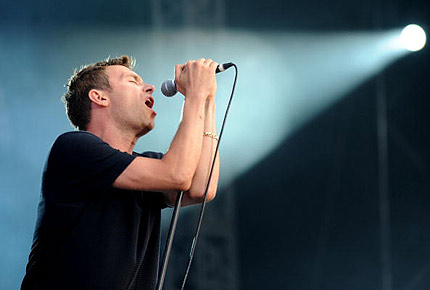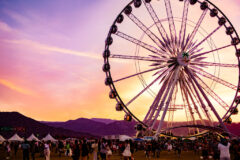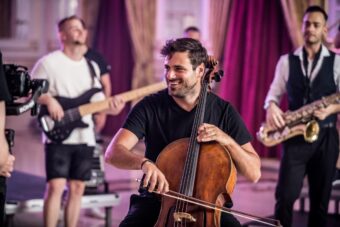Even for a summer packed with high-profile arena shows — Oasis, U2, Coldplay, and even Jay-Z — there’s really only one gig in London this week: Blur are back.
Ten years after they last played together, and seven years since guitarist Graham Coxon left their ranks during the making of final album Think Tank, the ’90s Britpop heroes have buried their differences and reunited for a string of gigs. Their 50,000-capacity show at the city’s Hyde Park Thursday night (and a second show Friday) sold out in hours — and for good reason.
Already this week, the London four-piece turned in a triumphant set at the Glastonbury Festival. But as frontman Damian Albarn told the audience Thursday night, when Blur first discussed comeback shows, Hyde Park was top of the list. He used to live nearby, and it was in these sprawling, leafy environs that he wrote “Parklife,” the title track from their totemic 1994 set, one of the defining albums of British alt-pop.
Let’s get the gripes about Hyde Park out of the way first. The sound was terrible, undulating in muddy waves across the huge site. “Chemical World” and “Sunday Sunday,” from 1993’s Modern Life Is Rubbish, suffered the most, partly because they possess two of the least memorable melodies written by these muscular-pop maestros.
The thrashy punk of “Jubilee” survived, but just by sheer force of will and momentum of the band.
The atmosphere, too, was less celebratory and cohesive than at Glastonbury. There, the festival crowds sang the refrain to beautiful gospel ballad “Tender” (“oh my baby, oh my baby…”) long into the night; here, the song generated a bit of a desultory sing-along. It was as if the Hyde Park crowd popped in after a long day at their city center offices, and were more interested in enjoying an al fresco booze-up in the blazing sunshine of a summer evening.
But with a back catalogue like Blur’s, culled from seven idiosyncratic and always intriguing albums, it would be hard for them to fail — especially when the four bandmates played the 25-song set with such brio, energy, and evident enjoyment at being back together.
The performances of “Tracey Jacks,” with Albarn spitting the lyrics, and of early single “There’s No Other Way,” were as engaging and vigorous as the frontman’s jumping-bean antics.
On the ghostly, spectral “Beetlebum” and the proto grunge anthem “Song 2,” Coxon offered reminders aplenty that he’s one of the most gifted guitarists of his generation.
And in the twinkling orchestral electronica of “The Universal” and the valedictory “End Of The Century,” Blur reaffirmed their place in the lineage of great English songwriters, from the Beatles and the Kinks onwards.
In the end it was thrilling to note that, other than the shouty, lager-lad-anthem “Parklife,” Blur’s songs have dated not one iota.
The best “new” band in Britain in 2009? That’ll be four early forty-somethings celebrating their 20th anniversary with some of the best gigs of their career.
Blur setlist:
“She’s So High”
“Girls & Boys”
“Tracy Jacks”
“There’s No Other Way”
“Jubilee”
“Badhead”
“Beetlebum”
“Out Of Time”
“Trimm Trabb”
“Coffee & TV”
“Tender”
“Country House”
“Oily Water”
“Chemical World”
“Sunday Sunday”
“Parklife”
“End Of A Century”
“To The End”
“This Is A Low”
“Popscene”
“Advert”
“Song 2”
“Death Of A Party”
“For Tomorrow”
“The Universal”





